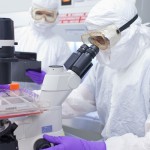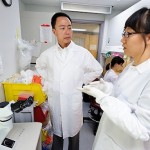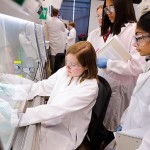Tag Stem cells
Biomanufacturing center takes central role in developing stem-cell therapies
Developing a new drug takes enormous amounts of time, money and skill, but the bar is even higher for a promising stem-cell therapy. Many types of cells derived from these ultra-flexible parent cells are moving toward the market, but the very quality that makes stem cells so valuable also makes them a difficult source of therapeutics. Read More
Exhibiting signs of life
What if you could travel back in time 3 billion years, and take a breath? What would earth’s air smell like? Deeply stinky, according to Brooke Norsted, an outreach specialist for the University of Wisconsin–Madison Geology Museum. Read More
Waisman scientists model human disease in stem cells
Many scientists use animals to model human diseases. Mice can be obese or display symptoms of Parkinson's disease. Rats get Alzheimer's and diabetes. But animal models are seldom perfect, and so scientists are looking at a relatively new type of stem cell, called the induced pluripotent stem cell (iPS cell), that can be grown into specialized cells that become useful models for human disease. Read More
Two researchers named Shaw scientists
The Greater Milwaukee Foundation has chosen two University of Wisconsin–Madison researchers for 2013 Shaw Scientist Awards. Read More
Material screening method allows more precise control over stem cells
When it comes to delivering genes to living human tissue, the odds of success come down the molecule. The entire therapy - including the tools used to bring new genetic material into a cell - must have predictable effects. Read More
Stem cell symposium to address heart, vascular disease
World leaders in the use of stem cells will gather Wednesday, April 10 at the BioPharmaceutical Technology Center Institute in Fitchburg, Wis., for the eighth annual Wisconsin Stem Cell Symposium, "Cell-Based Therapy for Heart & Vascular Disease: Pathways to Clinic." Read More
The language of stem cells, decoded
Stem cells are biological building blocks, the starting point of human life. But without proper direction, they're not very useful when it comes to treating disease. Read More






